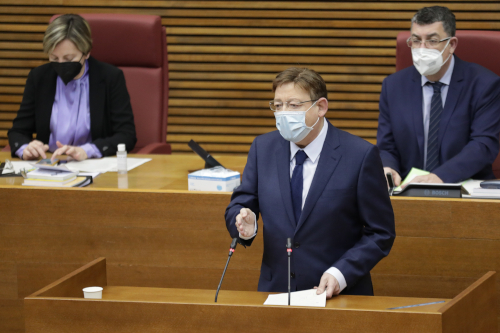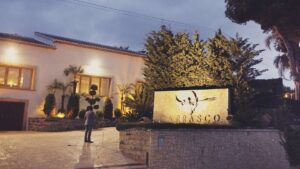Ximo Puig announces that the Valencian region will have vaccination points in 161 municipalities
In addition to the spaces in València, Alicante, Castelló and Elche, cities with more than 50,000 inhabitants will have different points and the rest will have locations in 145 municipalities.

Friday 26th February 2021 | MIKE SMITH
The president of the Generalitat Valenciana, Ximo Puig, has announced that the regional government is finalizing the general vaccination plan for the population of the region, which establishes that the Comunidad Valenciana will have points for the administration of doses against COVID-19 in 161 municipalities.
This was explained during his weekly Q&A session in the Corts Valencianes, in which he confirmed that the four large cities will have mass vaccination points (the Ciutat de les Arts in València, the Ciudad de la Luz in Alicante, IFA in Elche and the Palacio de Congresos in Castelló de la Plana) and added that cities with more than 50,000 inhabitants will have different immunization points and that the health departments will set locations in 145 municipalities for the rest of the population.
He also confirmed that, to face this mass vaccination of the population, staff of the Department of Health will be reinforced with staff from the private sector as well as retired health personnel.
Puig began his statement by underlining that, in order to face the “blow to democracy” caused by 23-F1, of which this week has been forty years old, the answer was “citizen, political and institutional unity“, and the “blow to the welfare state” that has been caused by the pandemic must be fought with “cohesion and unity” together with vaccination.
The president said that vaccination is precisely the “great asset” to overcome the pandemic and confirmed that a total of 100,996 Valencians are already immunized and that, up to this Wednesday, 288,735 doses had been administered.
The president explained the “road map” that the regional government has drawn up to face the health and economic crisis generated by the pandemic is not the result of “improvisation” or “fancy notion“, but is due to actions adopted following technical criteria and a sustained economic effort in unprecedented health spending.
He was referring to the expansion of health capacities thanks to an investment of 8,150 million in 2020, the largest made so far, according to the data from the budget statement that the regional government will approve this Friday.
In addition, he claimed that “no region has helped [sectors] as much” as those most affected by the pandemic as the Comunidad Valenciana.
Puig alluded to the improvement in indicators after a few “very tough” weeks, with the accumulated incidence having fallen by 88%, 12 points more than the average for Spain, since the maximum impact in the third wave.
In addition, the number of people with the disease has dropped from 72,000 in the worst moments of the pandemic to 12,356 now, a decrease of 83%. “Unfortunately, there are still 1,351 people hospitalized“, but he pointed out that “it is less than half” that of 14 days ago, adding that the number of people in the ICU has been reduced by 45% in the last two weeks.
Puig pointed out that these figures have been achieved thanks to the “magnificent work” and the “enormous effort” of the health personnel, and also to the joint responsibility of citizens in complying with the restrictions established to tackle the pandemic.
He has explained that the number of social relationships in risk environments has been reduced by 60%, above the reduction in Catalonia or Madrid and with the greatest drop in Spain. In addition, according to the data provided by the president, the number of people who do not have social relationships with people outside the home has tripled and the closure of the hotel industry has resulted in a 20% reduction in movement, amounting to 35% in the city of Valencia.
“Rigor, scientific evidence and proportionality” have been the premises of the Valencian Government’s action at all times, added the president, who has highlighted the need to be “extremely prudent in de-escalation“.
1 23-F refers to the attempted coup d’etat of February 23rd 1981 in which Lieutenant-Colonel Antonio Tejero led 200 armed Guardia Civil officers into the Congress of Deputies during the vote to elect a President of the Government and held those in the chamber hostage for 18 hours until the king Juan Carlos I denounced the coup in a televised address, forcing the hostage-takers to surrender the following day.
Information Source
Press Release – Generalitat Valenciana




